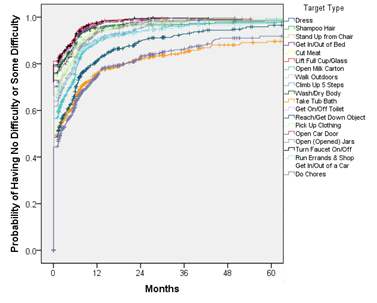Session Information
Session Type: ACR Poster Session C
Session Time: 9:00AM-11:00AM
Background/Purpose :
The
Health Assessment Questionnaire (HAQ) remains the gold standard for measuring patient-reported
functional status in rheumatoid arthritis (RA) and is included among the
measures suggested by the American College of Rheumatology for making treatment
decisions in routine care. We have previously shown that significant
variability exists in the correlation of individual HAQ questions with
patient-reported and clinical outcomes. The aim of this analysis was to assess,
in routine care, the timelines of HAQ improvement as compared to clinical
improvement and to examine possible differences in the improvement of
individual questions.
Methods :
BioTRAC
is an ongoing, prospective registry of patients initiating treatment for RA,
ankylosing spondylitis, or psoriatic arthritis with infliximab (IFX) or golimumab
(GLM). Eligible people for this analysis included RA patients treated with IFX
who were enrolled since 2002 or with GLM enrolled since 2010. Time to achieving
minimal important difference (MID; Δ≥0.22) in HAQ, HAQ≤1,
minimal disease (MD) in individual HAQ questions (no or some difficulty), CDAI
low disease activity (LDA), or CDAI remission was assessed with the
Kaplan-Maier estimator of the survival function and cox regression.
Results:
A
total of 1205 patients (75.3% female) were included with mean (SD) age of 56.0
(13.6) years and disease duration of 8.4 (8.9) years at baseline. Mean (SD) HAQ
and CDAI were 1.55 (0.72) and 33.8 (17.4), respectively.
Statistically
significant and clinically meaningful improvements in both HAQ and CDAI were
observed over time. The cumulative probability of achieving HAQ MID,
HAQ≤1, CDAI LDA, and CDAI remission by 12 months was 69.5%, 54.5%, 54.1%,
and 18.1%, respectively. Time to achieving HAQ MID [Hazard Ratio (95% CI): 3.6
(3.2-4.2)], HAQ≤1 [2.9 (2.6-3.4)], and CDAI LDA [3.1 (2.7-3.6)] was
significantly lower as compared to CDAI remission.
With
respect to individual HAQ questions, at baseline, the most predominant usual
activities that patients were unable to do were taking a tub bath (27.9% of
patients), reaching and getting down a 5-pound object from the head (21.8%),
and doing chores such as vacuuming or yard work (23.2%). In accordance, time to
having no or some difficulty in these activities was significantly higher
compared to the remaining HAQ items (Figure 1).
Conclusion:
The
results of this analysis show that the timelines for achieving HAQ targets in
routine care is comparable to that of achieving CDAI LDA. Significant
differences were observed in terms of improvement in individual HAQ items with
the inability to take a tub bath, getting heavy overhead objects down, and
doing chores being the most persistent.
Figure
1. Time to Having No Difficulty or Some Difficulty in Individual HAQ Questions
To cite this abstract in AMA style:
Arendse R, Haraoui B, Choquette D, Kelsall J, Baer P, Sholter D, Bensen WG, Bell MJ, Teo M, Rampakakis E, Psaradellis E, Osborne B, Tkaczyk C, Maslova K, Nantel F, Lehman AJ. What Is the Variability of HAQ over Time in Patients with Rheumatoid Arthritis Treated with Anti-TNF? [abstract]. Arthritis Rheumatol. 2015; 67 (suppl 10). https://acrabstracts.org/abstract/what-is-the-variability-of-haq-over-time-in-patients-with-rheumatoid-arthritis-treated-with-anti-tnf/. Accessed .« Back to 2015 ACR/ARHP Annual Meeting
ACR Meeting Abstracts - https://acrabstracts.org/abstract/what-is-the-variability-of-haq-over-time-in-patients-with-rheumatoid-arthritis-treated-with-anti-tnf/

